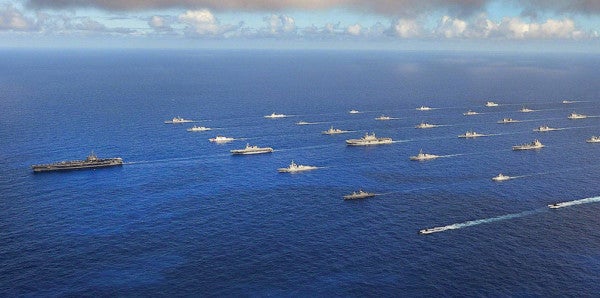How Pirates Made The US Navy Into The Strongest Sea Force On Earth
When the Revolutionary War came to a close, the United States spent nearly a decade without a regular navy. With...

When the Revolutionary War came to a close, the United States spent nearly a decade without a regular navy. With the war against Great Britain won, the reasoning went, why would it need one? The simple answer is: pirates.
After breaking with England, American merchant ships were no longer protected by the Royal Navy. The fledgling U.S. government couldn’t raise a Navy but believed it could stave off attacks from Barbary pirates — north African privateers from Algiers, Morocco, Tunis, and Tripoli with loose ties to the Ottoman Empire — through treaties.
While the Moroccan pirates cooperated, Ottoman Algerian leader Dey Mohammed ben-Osman declared war on the United States, capturing a merchant ship in 1784, and offered to assume peaceful relations only if the U.S. government could pay him a tribute. Though the U.S. was able to negotiate a treaty with Morocco in 1786, Congress didn’t have the money to pay off Mohammed, according to records held by the U.S. State Department.
Luckily for then-President George Washington, Portugal was warring with Algiers and protected U.S. merchant ships — until 1793, when the two states reached a truce, opening American vessels up to attack once more.
Desperate to utilize the Mediterranean trade route and protect American ships, the 1794 Congress, at Washington’s urging, authorized the “gradual creation” of the U.S. Navy with a fleet of just six ships.
Wikimedia Commons

Shortly after, America’s Navy got its first taste of military action against its Revolutionary ally, France, in 1798, when its monarchy fell and the U.S. government stopped paying off its debts from the war. This angered France, along with the fact that the United States and Great Britain settled colonial disputes in the Jay Treaty — a move that France viewed as violating the U.S.’s public commitment to neutrality in the English-French squabble.
After this “Quasi War,” then-President John Adams would become known as the “Father of the American Navy” as a result of his strong advocacy for a formidable sea service, which included the acquisition of “twelve vessels, of up to twenty-two guns each,” according to an annotated bibliography by the Navy’s history division.
A small but aggressive force, the nascent U.S. Navy was particularly effective at pressing France to bend to America’s wishes. “In the war, the navy proved itself an effective instrument of national policy,” the bibliography reads.
However, the U.S. government was struggling to keep the Barbary states at bay, with financial tributes reaching roughly $1.25 million by 1797.
Congress still fell $140,000 short to Algiers and nearly $150,000 short to Tripoli, according to author Gregory Fremont Barnes’ 2014 book “The Wars of the Barbary Pirates.” By 1801, the stiffed pirates of Tripoli had launched a full-on campaign against the U.S. that would later be deemed the First Barbary War. The war proved the prowess of the Navy’s early officers, particularly Commodore Richard Dale and Capt. Stephen Decatur. Their 1805 victory would mark the first win for the U.S. Navy, with the help of the Marine Corps. But peace would be short-lived.
WIkimedia Commons

REA197457 Bombardment of Algiers, August 1816, 1820 (oil on canvas) by Luny, Thomas (1759-1837); 122×183 cm; Private Collection; ¬© Royal Exchange Art Gallery at Cork Street, London; English, out of copyright
Hajji Ali, the new Dey of Algiers, decided that the tribute agreement of his predecessor was insufficient, and launched the Second Barbary War in 1812 — the same year that the United States began warring once more with Great Britain. With its resources spread thin, the U.S. government was forced to table any efforts to confront Algiers or its pirates.
It wasn’t until the Treaty of Ghent was signed in 1814, ending the United States’ last skirmish with England, that the Navy was able to set its sights on Algiers — and an end to Barbary piracy once and for all. Congress officially declared war on Algiers March 3, 1815, after growing the U.S. Navy for three years and placing now-Commodore Decatur at the helm.
After destroying a number of Algerian warships and capturing hundreds of their sailors, Decatur negotiated a prisoner exchange and “called for end to the practices of tribute and ransom,” the State Department reported. The Algerian treaty was officially ratified by the Senate on December 5, 1815.
Although the Barbary pirates would continue to plunder and pillage French ships in the Mediterranean for two more decades, they scarcely dared mess with the U.S. Navy — one of the most aggressive forces on the sea — ever again.